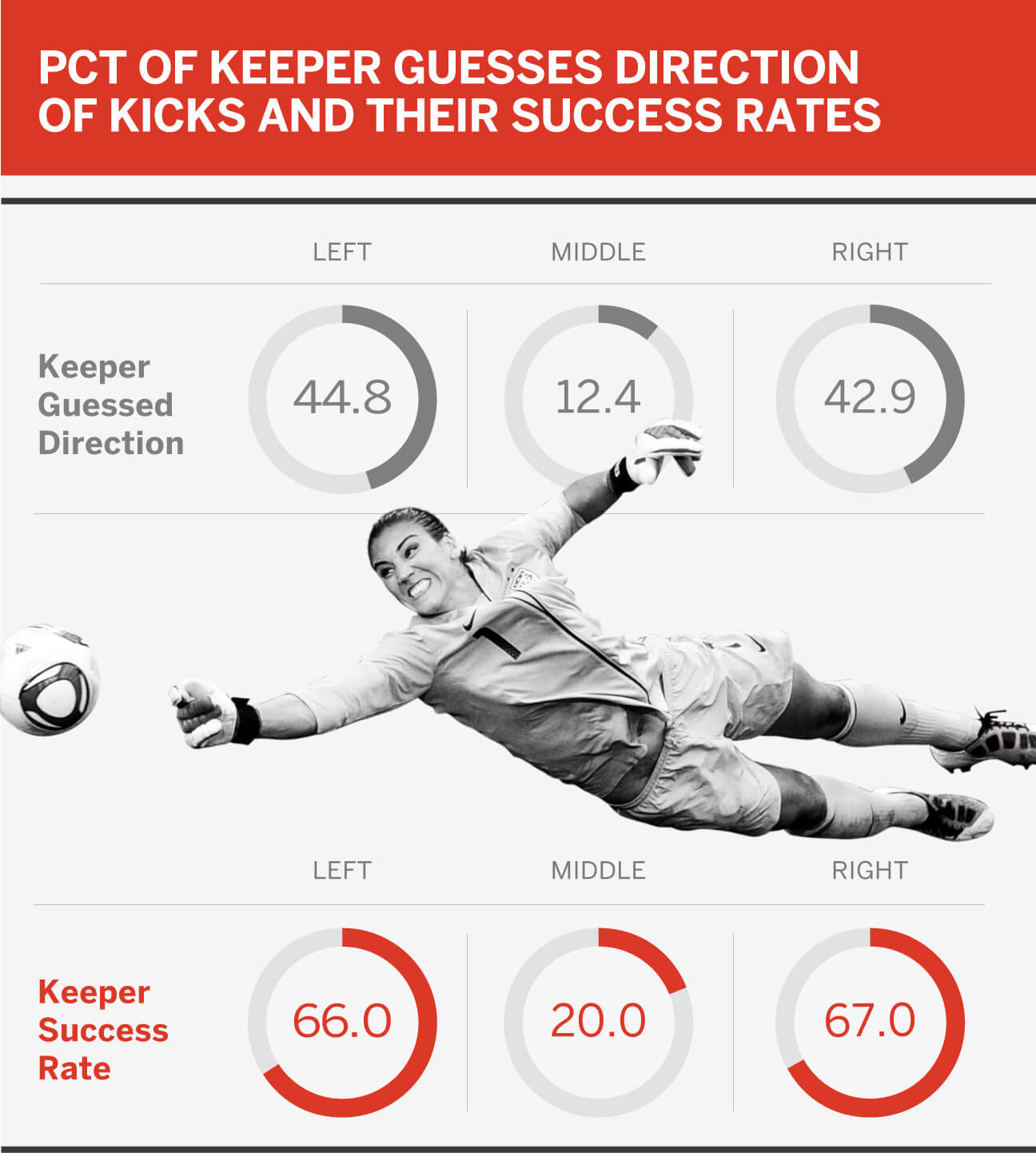As we head into the knockout rounds of the 2019 FIFA Women’s World Cup, it’s when games are settled not with draws or VAR, but a good ol’ penalty shootout. You know the rules by now, right? Two teams line up and individual players take turns shooting at the goal. The keeper dives to a side, and sometimes gets it right. If the teams are tied after five kicks, they each take turns until one team finishes with more.
With the Round of 16 kicking off Saturday at 11:30 a.m. ET, we look back at every shootout in the history of the Women’s World Cup and Olympic women’s soccer tournaments, the two major women’s soccer world events, to see what history tells us.
Out of those 10 shootouts and 105 total shots taken over that span, we boiled down the shootout to its basic events. Shooter versus keeper, goal or save. Now, most games will never sniff penalty kicks, but two championships have been decided on PKs, 1999 and 2011. And, in those situations, teams will want their most accurate shooters and agile keepers.
Order of play: The unlucky five spot
Teams tend to put their better shooters early in the lineup, while leaving their best scorer in the four spot, where they have been nearly perfect with a 95-percent success rate. Over the years, the four spot has been home to prolific scorers like Mia Hamm, Abby Wambach, Suki Kamagai and Wendie Renard. What’s going on in the five spot, though? Whether it’s nerves, or just good keepers, the five-spot shooter has barely converted half of their kicks. And star players have fallen to this — just ask Brazilian striker Marta, who shot fifth in the 2016 Rio Olympics, and had her shot saved in a semifinals loss against Sweden.

The middle ground
Watching a shootout, you’d think the keeper has an impossible task. The net is so wide, the ball is so close, the kick is coming in so fast. Keepers have to make a split-second judgment on where to dive before even seeing where the kick is headed. The one thing you don’t want to do, according to the data: aim for the middle. Keepers guessed correctly on two thirds of kicks to either direction, but had the worst rate on kicks down the middle. Case in point: Then-USWNT keeper Hope Solo failed to dive to a side on a Sweden penalty kick that went to the right and knocked the U.S. out in the quarterfinals of the 2016 Olympics.

Kick direction and location are also paramount
It’s all in the feet: The footedness of the kicker can tell us something. Most kickers have the natural tendency to go across their body, as in a right-footed kicker will usually curve the ball to the left. When right-footed kickers shoot to the left, the keeper guesses correctly 70 percent of the time. When left-footed kickers shoot to the right, the keeper guesses correct 78 percent of the time.
However, you don’t usually have to worry about left-footers, unless you’re facing Brazil. Only 19 percent of shootout shots have come with the left foot, but Brazil have taken 52 percent of their shootout shots from that stance in World Cups or Olympics. Another left-footed shot you may remember would be Brandi Chastain’s Cup-clinching goal for the United States against China in 1999.
Right-footed kick direction
- Left: 50.6 percent (76.7 percent success rate)
- Middle: 10.6 percent (55.6 percent success rate)
- Right: 38.8 percent (72.7 percent success rate)
Left-footed kick direction
- Left: 50 percent (80 percent success rate)
- Middle: 5 percent (0 percent success rate)
- Right: 45 percent (88.9 percent success rate)
All on the line: When teams are looking to score a clincher, they’ve sent it to the back of the net 75 percent of the time. When teams are kicking to stay alive, they only prolong the game half of the time (50 percent).
Don’t cut the corners: It should shock absolutely no one that players should aim for the corners, which is where 71 percent of kicks have gone. Kicks to one of the four corners have a success rate of 80 percent because you’re aiming them to where the keeper would have the absolute longest distance to catch up. Most shooters, though, keep it low rather than elevating it. The two most common spots are low-left (29 percent) and low-right (19 percent).
Familiar with the shootout? The United States and Brazil have each gone to the shootout four times, the most by any team, including against each other in 2011. They could face one another again in the quarterfinals in France. Carli Lloyd (USWNT) and Marta (Brazil) have competed in three shootouts, the most of any players.
And lastly … Be first. Teams that shot first went on to win 70 percent of the time.
